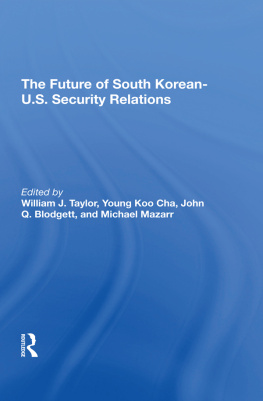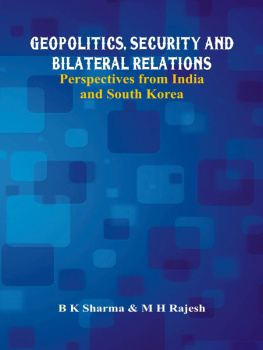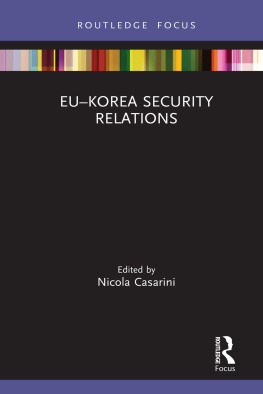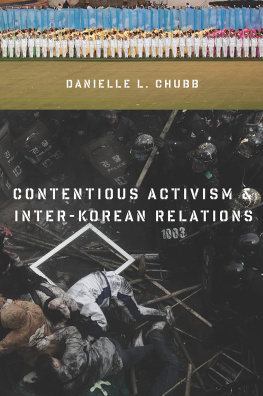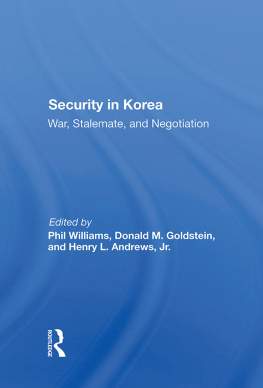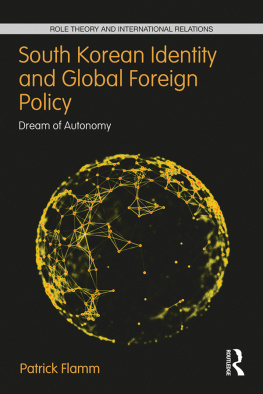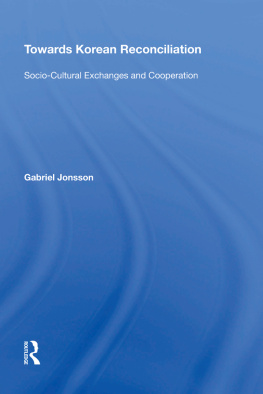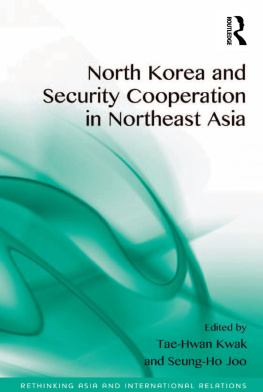The Future of South KoreanU.S. Security Relations
Published in cooperation with the Center for Strategic and International Studies, Washington, D.C., and the Korea Institute for Defense Analyses, Seoul
First published 1989 by Westview Press
Published 2019 by Routledge
52 Vanderbilt Avenue, New York, NY 10017
2 Park Square, Milton Park, Abingdon, Oxon OX14 4RN
Routledge is an imprint of the Taylor & Francis Group, an informa business
Copyright 1989 Taylor & Francis
All rights reserved. No part of this book may be reprinted or reproduced or utilised in any form or by any electronic, mechanical, or other means, now known or hereafter invented, including photocopying and recording, or in any information storage or retrieval system, without permission in writing from the publishers.
Notice:
Product or corporate names may be trademarks or registered trademarks, and are used only for identification and explanation without intent to infringe.
Library of Congress Cataloging-in-Publication Data
The Future of South Korean-U.S. security relations/edited by William
J. Taylor, Jr., Young Koo Cha, John Q. Blodgett, and Michael Mazarr.
p. cm.
1. Korea (South)National security. 2. United StatesNational
security. 3. Korea (South)Military relationsUnited States.
4. United StatesMilitary relationsKorea (South). I. Taylor,
William J. (William Jesse), 1933 . II. Cha, Young Koo, 1947
III. Blodgett, John Q. IV. Mazarr, Michael. V. Title: Future of
South Korean-US security relations.
UA853.K6F88 1989
8925038
355.03305195dc20
CIP
ISBN 13: 978-0-367-29237-9 (hbk)
Contents
, Amos A. Jordan and Kwan Young Hwang
, Amos A. Jordan
, John Q. Blodgett
, Ernest Graves
, Young Hoon Kang
, Bernard E. Trainor
, Thomas H. Moorer
, Chong-Wook Chung
, Ki-Tak Lee
, Sang-Seek Park
, Young-Sun Ha
, Duk-Choong Kim
, William J. Taylor, Jr.
, Larry A. Niksch
, Young Kao Cha
, John H. Cushman
, Jack N. Merritt
, Kwan-Chi Oh
, Patrick J. OConnell
, Dong Joon Hwang
, William J. Taylor, Jr., and Young Koo Cha
For thirty years following the end of the Korean War, Northeast Asia has been locked in a seemingly permanent rivaliy between the competing economic and political systems of the United States, Japan, and South Korea, on the one hand, and the Soviet Union, China, and North Korea on the other. On the security front, Soviet and Chinese military assistance to North Korea and the Soviet military presence in the northern territories of Japan have been countered by the U.S. commitment to the regions security, as demonstrated by the stationing of U.S. troops in South Korea and Japan. Although no major flare-ups have occurred in Northeast Asia since the Korean War, tensions have remained high, particularly on the Korean Peninsula, where a combination of concentrated military forces and North Korean bellicosity has contributed to regional uncertainty.
Beginning in the mid-1980s, the economic and political situation in Northeast Asia began to change dramatically. The rapid economic gains made by South Korea in the late 1960s and through the 1970s began to bear real fruit a decade later, improving the well-being of the Korean people and laying the groundwork for the emergence of far-reaching political democratization. This progress-symbolized by Koreas hosting the 1988 Summer Olympics underscored both the woeful condition of the economies of China, the Soviet Union, and North Korea and the lack of democracy in these countries.
In an effort to improve the Soviet Unions deteriorating economy, the Kremlin, under Mikhail Gorbachev, began to institute an ambitious program of political and economic reform. At the same time, China continued to press forward with the major economic reform program launched by Deng Xiaoping in the late 1970s. One result of these efforts in both countries has been a series of political and economic overtures to the West, in an effort to gain access to Western technology and credits. In Northeast Asia, this shift has been most noticeable in a distancing by the Soviet Union and China from North Korea and the promotion of economic and even political relations with South Korea. As a result, overall threat perceptions in the region are diminishing.
Against this backdrop, the primary guarantor of Western interests in Northeast Asia, the United States, appears to be entering a period of transition. Severe economic problems at home, evidenced by large U.S. budgetary and trade deficits, have raised questions about the wisdom of the United States maintaining its military presence in the region at current levels, particularly in light of the growing trade deficits with its Korean and Japanese allies. The confidence of these allies in the United States may be weakening as a result. In addition, the growing political maturity of the Korean people has caused some segments of public opinion in that country to question the current framework ofand, in some instances, the very need forthe ROK- U.S. security relationship.
In an effort to assess the impact of these developments on long-term ROK-U.S. relations, two institutions-the Center for Strategic and International Studies (CSIS), based in Washington, D.C., and the Korea Institute for Defense Analyses (KIDA), located in Seoul-brought together the excellent papers presented in this volume. They should prove of great interest to scholars and policymakers alike. It is our hope that they will also be useful to U.S. and ROK political leaders as they work to adjust and strengthen the three-decade-old ROK-U.S. alliance to meet the challenges of a rapidly changing international environment.
Amos A. Jordan
Kwan Young Hwang
Amos A. Jordan
It is undoubtedly fair to say that the remarkable political transformation that has occurred in the Republic of Korea since 1953 has simply astonished the world. Many governments today stand in admiration of Koreas economic and political miracles. Americans, in particular, take special pride because of our long association and the contributions we have made to Korean security. Our ties should be deepened by these events in the political and economic realm because they demonstrate anew our shared values. We are going to need that increased solidity and strength in our relationships to tackle the difficult challenges that lie ahead.
We face a period of unprecedented fluidity in relationships in Northeast Asia Both the Communist giants-the Peoples Republic of China and the Soviet Union-are undergoing a period of dramatic change, the outcome of which is not entirely predictable. In China, economic reform leads political reform; in the Soviet Union, the reverse is true. But in both cases, extraordinary difficulties lie ahead, and it is by no means certain that those countries will meet them successfully. In the meantime, the configuration of power in Northeast Asia has changed and will continue to do so. Not only are Chinese and Soviet relationships with one another changing, each is reaching out to other Asian, as well as non-Asian, countries to buttress their positions, and each is adapting its foreign policy to these new circumstances.

